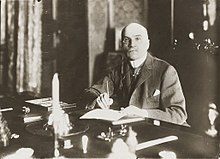Maurice Paléologue

Maurice Paléologue (13 January 1859 – 18 November 1944) was a French diplomat, historian, and essayist. He played a major role in the French entry into the First World War, when he was the French ambassador to Russia and supported the Russian mobilization against Germany that led to world war.
Biography
Paléologue was born in Paris as the son of Alexandru Paleologu, a Wallachian Romanian revolutionary who had fled to France after attempting to assassinate Prince Gheorghe Bibescu during the 1848 Wallachian revolution. Alexandru was one of three illegitimate children of Elisabeta Văcărescu of the Văcărescu family of boyars. He and his siblings were later adopted by Zoe Văcărescu, Elisabeta's mother, who gave the children her Greek maiden name Paleologu. The name became Paléologue in French language spellings. The family's relation to the Palaiologos Byzantine Imperial family is doubtful, though Alexandru's ancestors claimed it at the end of the 17th century.[1]
Diplomat
After graduating in law, Maurice Paléologue obtained a position with the French Foreign Ministry in 1880, and moved on to become Embassy Secretary at Tangiers in the Morocco Protectorate, then in Beijing (China), and later in Italy. A Minister Plenipotentiary in 1901, he represented France in Bulgaria (1907–1912) and Imperial Russia (1914–1917). He became General Secretary of the Foreign Ministry in the Alexandre Millerand cabinet.
An Austrian diplomat described his personality in 1911:
- about 50 years old, unmarried....[he is] prominent, vivacious, well educated, but displays a fantastic imagination and is an author of novels. [He] permits his novelist's imagination to run away with him when he interprets insignificant military or political events, and, for those who do not know him well, he is therefore dangerous as a source of information.[2]
The British ambassador to Moscow in 1914 provided a similar description:
- He is a very cultivated man, a writer of light romances, as well as books of a more serious vein; but...his vivid imagination is apt to run away with him and disposes him to take a fanciful and exaggerated view of the political questions with which he has to deal.[3]
His most important and controversial role came when he was the French ambassador to Russia in July 1914. He hated Germany and saw that when war broke out France and Russia had to be close allies against Germany. His approach was in agreement with Prime minister Raymond Poincaré who trusted him. He promised unconditional French support to Russia in the unfolding crisis with Germany and Austria. Historians debate whether he exceeded his instructions and thereby helped hasten the war. There is agreement that he failed to inform Paris of exactly what was happening, and the implications of the Russian mobilization in launching a world war.[4][5][6][7]
His writings
Paléologue published essays and novels, and wrote contributions for the Revue des deux mondes. He also wrote several works on the history of Russia in the wake of which included an intimate portrait of the last Tsaritsa Alexandra Fyodorovna. He had been present at meetings between her and Grigori Rasputin, among others. He was called on to give his testimony during the Dreyfus Affair, and left important notes on the topic.
Paléologue was elected a member of the Académie française in 1928. He died in Paris a few months after the city's liberation in 1944.
References
- ^ Neagu Djuvara, Între Orient şi Occident. Ţările române la începutul epocii moderne, Humanitas, Bucharest, 1995, p.131-132
- ^ William A. Renzi, "Who Composed" Sazonov's Thirteen Points"? A Re-Examination of Russia's War Aims of 1914." American Historical Review (1983): 347-357 at p 352. in JSTOR
- ^ Renzi, "Who Composed" Sazonov's Thirteen Points"? A Re-Examination of Russia's War Aims of 1914." p 352
- ^ Robert O. Paxton, Europe in the 20th Century (1985) p 60.
- ^ Richard F. Hamilton and Holger H. Herwig. Decisions for war, 1914-1917 (2004) pp 121-22.
- ^ Christopher Clark, The sleepwalkers: How Europe went to war in 1914 (2012) pp 435-50, 480-84.
- ^ Sidney B. Fay, The Origins of the World War (1934) 2:443-46.
Further reading
- Halfond, Irwin. Maurice Paléologue: The Diplomat, the Writer, the Man, and the Third French Republic (University Press of America, 2007).
- Paléologue, Maurice. An Ambassador's Memoirs (English translation, 1924).
External links
- 1859 births
- 1944 deaths
- Burials at Passy Cemetery
- Writers from Paris
- French biographers
- French essayists
- French historians
- 19th-century French novelists
- 20th-century French novelists
- Politicians of the French Third Republic
- Members of the Académie française
- French people of Romanian descent
- Văcărescu family
- Ambassadors of France to Russia
- 19th-century French diplomats
- 20th-century French diplomats
- People associated with the Dreyfus affair
- Male essayists
- French male novelists
- 19th-century male writers
- 19th-century essayists
- 20th-century essayists
